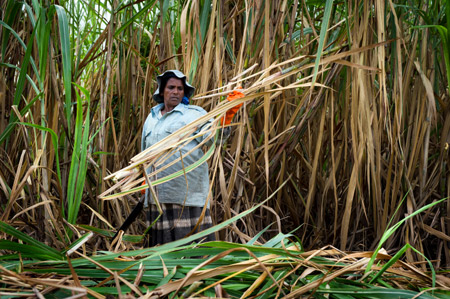Brazil Area’s Sugar Harvest to Start Early on Record Crop
Category: Sugar
 (Bloomberg) – Sugar-cane harvesting in Brazil’s center south, the main growing region of the world’s largest producer, will start earlier this year because of a record crop, according to Sucden do Brasil, a unit of Sucrees et Denrees SA.
(Bloomberg) – Sugar-cane harvesting in Brazil’s center south, the main growing region of the world’s largest producer, will start earlier this year because of a record crop, according to Sucden do Brasil, a unit of Sucrees et Denrees SA.
Harvesting will start about three weeks earlier than last year as millers try to crush a record 580 million to 585 million metric tons in the 2013-14 season, which starts in April, Jeremy Austin, general manager at the Sao Paulo-based subsidiary, said in an interview at the Kingsman SA sugar conference in Dubai today. That compares with 531.9 million tons this season, according to data from industry group Unica.
“On average, the crop will start three weeks earlier than last year because everybody needs to try to get the cane in and start crushing to make sure they don’t run into rain at the end of the crop,” Austin said, referring to millers’ inability to crush when it rains. “Some mills will start in March, those who traditionally start early like those in Parana and Mato Grosso do Sul. In Sao Paulo state, it will be from the start of April.”
Brazil’s center south probably won’t be able to crush the whole crop, which may rise to as much as 610 million tons, as some mills will close this year due to financial difficulties, he said. Between three and 10 mills probably won’t open in the 2013-14 season, according to Austin.
Ethanol Share
The area’s sugar production will be 34 million to 36 million tons in 2013-14, depending on how much cane gets allocated to making ethanol, he said. Output may be as low as 32 million tons, depending on factors such as whether the government reduces taxes on the biofuel, if more ethanol goes to the U.S. to fulfill that country’s biofuels mandate, and sugar prices fall while ethanol prices rise.
Petroleo Brasileiro SA (PETR4), Brazil’s state-controlled oil company, increased gasoline prices at refineries by 6.6 percent last month. That may boost consumption of hydrous ethanol, the kind used in flex-fuel cars. The government also will raise the amount of anhydrous ethanol blended into gasoline to 25 percent in May from 20 percent now. The Brazilian government’s control over gasoline prices in a bid to limit inflation resulted in a decline in demand for the biofuel.
“There is conversation and discussion again between the sugar sector and the government, which is looking a little more positive, because to date there has been little discussion and the results have only been negative,” Austin said.
Sucden sees the global sugar surplus at 5 million to 8 million tons in the 12 months starting in April.




